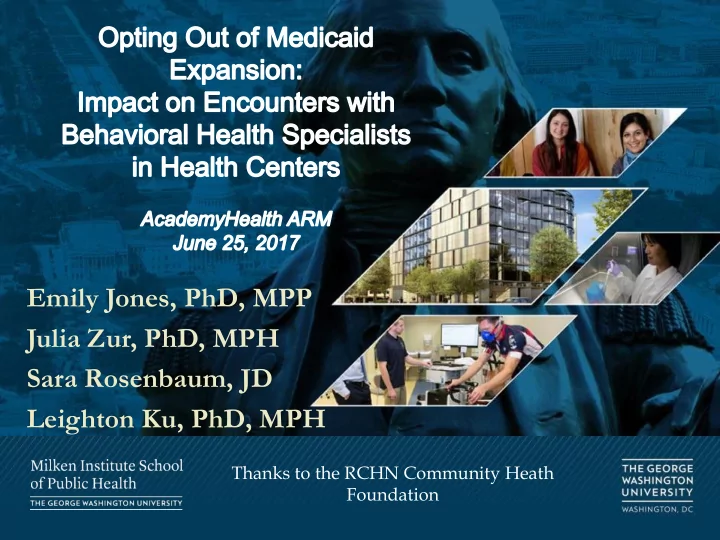

Emily Jones, PhD, MPP Julia Zur, PhD, MPH Sara Rosenbaum, JD Leighton Ku, PhD, MPH Thanks to the RCHN Community Heath Foundation
Overview • Increasing access to insurance helps bolster the care delivery infrastructure • This paper estimates the impact of state failures to expand Medicaid on capacity for specialist BH services in health centers – As of June 2014, 24 states has failed to expand • These findings highlight the negative consequences of rolling back gains in insurance
Introduction • CEA estimated $66 billion in economic activity through 2017 foregone by states that failed to expand • Evidence of inadequate MH/SUD treatment capacity – Workforce shortages – Unmet need and reasons for not accessing treatment – Waitlists – ED visits, hospitalizations – Rise in homelessness, need for MH/SUD services in CJ settings – Overdoses • Increased availability of MH/SUD services in primary care settings
Background • Federally-qualified health centers are an important source of BH capacity – Underserved areas – Homeless, CJ, schools • On-site BH capacity in health centers is not required – Found to be sensitive to grant funding • On-site MH/SUD capacity in FQHCs is important – FQHCs report problems referring patients to offsite specialist services – Can improve treatment initiation and engagement
Background Recent investments in BH capacity in health centers • Grant funding • Medicaid • Technical assistance and project ECHO-style behavioral health consultation model using telehealth • PCMH recognition
Methods FQHC Caseloads and Insurance Mix Total FQHC Revenues = Costs Number of MH/SUD Encounters
Methods • Change in FQHC caseloads – Change in insurance mix • FQHC revenues – Increase in revenues or reduction in losses • FQHC spending – Health center revenue funds the costs of service provision – Percentage of costs for MH/SUD specialist staffing and overhead: • 4.9% for MH • 0.7% for SUD • Number of encounters with MH/SUD specialists
Findings • Health centers in states that failed to expand Medicaid by 2014: – Located in the South – Rural: 58% versus 39% in expansion states – Smaller: 14k versus 21k patients per year – Less likely to be PCMH-recognized: 29% versus 37% – Caseloads skew slightly older • Caseloads in states that expand Medicaid: – Medicaid: increases from 37.1% to 47.1% – Uninsured: declines from 29.2% to 21.5%
Findings • If all states expand Medicaid by 2020, $230 million in additional revenue could accrue to health centers • $12.9 million would fund services provided by MH/SUD specialists – $11.3 million for MH services – $1.6 million for SUD services • Over 70,000 additional encounters – Over 59,000 with MH specialists – Over 11,000 with SUD specialists
Summary of Findings • Investments in insurance expansion bolster the care delivery infrastructure – When individuals gain insurance, MH/SUD providers gain revenue • This additional revenue can bolster capacity and increase access to treatment • These results illustrate one small, specific component of the much broader consequences of state failures to expand Medicaid
Policy Implications • States that failed to expand Medicaid are forgoing: – Federally-subsidized coverage that increases access for individuals – Funding for BH infrastructure • Medicaid is only one leg of the stool – Private insurance: parity enforcement – Grant funding also remains critical – Venture capital • If Medicaid is cut, grant funding will not be adequate to backfill
Policy Implications • Highlights importance of ACA outreach and enrollment assistance: FQHCs are hubs • Evan when increased funding for BH capacity is available, will health centers be able to find staff to hire? • Are evidence-based, quality treatment services being provided? – Screening and case identification? – Integrated, collaborative care? – Linkages to full continuum of services and supports, including social services?
Limitations • Narrow focus on impact of Medicaid expansion decisions on BH services in health centers – Only includes encounters with specialists • Projections based on 2012 patterns of spending on various health center services – Workforce shortages might constrain hiring • Optimal level of mental health and substance use disorder treatment capacity is unknown – Demand might increase with capacity
Jones, Zur, Rosenbaum, Ku. Opting Out of Medicaid Expansion: Impact on Encounters With Behavioral Health Specialty Staff in Community Health Centers. Psychiatric Services : https://www.ncbi.nlm.nih.gov/pubmed/26278224
Recommend
More recommend